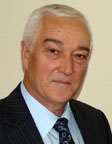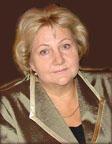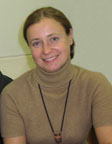Physiological, Biochemical and Genetic Mechanisms of Bacterial Biosynthesis and Conversion of Organic Compounds
Basic Division: Department of Microbiology and Immunology
Brief Description of Research Activities:
Developing biotechnologies based on the study of biochemical and genetic systems of transformation of organic compounds by bacteria will make it possible to replace the chemical processes of synthesis, hazardous for the environment and people’s health.
The scientists develop microbial strains with tailor-made properties. The strains are extracted as a result of selection, chemical mutagenesis and genetic modification for biotransformation, biocatalysis and biodecomposition of xenobiotics.
The investigators develop effective biocatalysts on the basis of producer microorganisms selected from natural and anthropogenic soil.
Within the trend the scientists study the enzymes produced by microorganisms and bacteria for the metabolism of organic acids and their derivatives. On this basis they carry out a research of effective ways to achieve regioselective and stereoselective transformation of chemical compounds by way of extracting bioactive substances and drug precursors which are highly difficult or impossible to acquire using traditional methods.
In the framework of the trend the investigators study new low molecular weight peptides of lantibiotic family which makes it possible to research effective antibacterial pluripotential medication of bacterial genus.
The scientists investigate the perspectives of the usage of actinobacteria of Rhodococcus genus which are able to go through oxidative transformation and biodestruction of problematic organic compounds in various spheres of biotechnology.
The investigators create a bank of specific polyclonal antisera against various kinds of rhodococci.
They study the Rhodococcus cell based multifunctional biocatalysts which will make it possible to develop base products of biosynthesis in hydrocarbon environment, carry out bioremediation of oil-contaminated biosystems and produce biologically active intermediates for pharmaceutical industry.
Within the trend the scientists develop a Regional Specialized Collection of Alkanotrophic Microorganisms (acronym for Institute of Ecology and Genetics of Microorganisms, # 768 in World Federation of Culture Collection) and effective ways of conservation and stationary storage of collection cultures.
In the framework of the trend the investigators also research the issues of microorganisms’ growth and development regulation: they study the molecular mechanisms of adaptation of microorganisms to the stress-bearing effect of the environment and establish the role of universal cell regulators, such as polyamines and thiol compounds.
Selected Publications Characterising Scientific Research Trend:
1. Anzyferov V.N., Porozova S.E., Ivshina I.B., Rychkova M.I., Pimenova N.V., Karmanov V.I. Nanoconstruction of crystal glass surface over actinobacteria of Rhodococcus genus// Nanotechnologies in Russia. 2008. Vol. 3, No. 9-10. P. 146-152. (in Russian)
2. Ivshina I.B., Rychkova M.I., Vikhareva Y. V., Chekryshkina L.A., Mishenina I.I. Alkanotrophic rhodococci as catalysts of biodecomposition process of non-operational medication // Applied Biochemistry and Microbiology. 2006. No. 4. P. 443-447. (in Russian)
3. Maksimova Y.G., Kovalenko G. A., Maksimov A.Y., Demakov V.A., Chuyenko T.V., Rudina N.A. Immobilized non-growing cells of Rhodococcus ruber as heterogenic biocatalysts for hydration of acrylonitrile into acrylamide // Catalysis in Industry. 2008. No.1. P. 44-50. (in Russian)
4. Maksimov A.Y., Demakov V.A., Maksimova Y.G., Olontsev V.F. Production process of immobilized biocatalyst and aqueous solutions of amide using this biocatalyst. Pat. No. 2352635, the Russian Federation. Priority on 22.03.2007. Reg. in State Utility Invention Registry 20.04.2009. (in Russian)
5. Кuyukina M.S., Ivshina I.B., Krivoruchko A.V., Podorozhko E.A., Lozinsky V.I., Cunningham C., Philp J.C. Novel biocatalysts based on immobilized Rhodococcus cells for oil-contaminated water purification // Journal of Biotechnology. 2007. Vol. 131, No. 2. P. 99-101. (In English)
The Most Important Fundamental Research Projects within Scientific Research Trend
1. The programme of fundamental research of the General Committee of the Russian Academy of Sciences “Molecular and cellular biology”. Project “Biosynthesis of capillary-active compounds as mechanism of adaptation of Rhodococcus for fixation of hydrophobic substrate”, 2006-2008. Project supervisor: Professor M.S. Kuyukina.
2. The programme of fundamental research of the General Committee of the Russian Academy of Sciences “Molecular and cellular biology”. Project “Mechanisms of biosynthesis and functional characteristics of biosurfactants of non-pathogenic actinobacteria”, 2009-2011. Project supervisor: Professor M.S. Kuyukina.
3. Integration programme of fundamental research carried out jointly with the Siberian Branch of the Russian Academy of Sciences. Project: “Microbial conversion of nitriles of carboxylic acids”, 2004-2009. Project supervisor: Corresponding Member of the Russian Academy of Sciences Professor V.A. Demakov.
4. The special purpose programme of interdisciplinary projects carried out jointly with the scientists of the Siberian Branch and the Far East Branch of the Russian Academy of Sciences. Project: “Development of scientific basis of bioremediation of oil-contaminated territories in temperate and frigid climate”, 2006-2007. Project supervisor: Corresponding Member of the Russian Academy of Sciences Professor I.B. Ivshina.
The Most Significant Applied Research Projects, including Enterprise Orders
1. Federal programme “Integration of science and higher education in Russia in 2002-2006”. Project No. I 0573 “New biocatalysts for conversion of nitriles and synthesis of bioactive compounds”, 2004-2005. Project supervisor: Corresponding Member of the Russian Academy of Sciences Professor V.A. Demakov.
2. Federal programme “Integration of science and higher education in Russia in 2002-2006”. Project “New biocatalysts for synthesis of bioactive compounds”, 2004-2005. Project supervisor: Corresponding Member of the Russian Academy of Sciences Professor I.B. Ivshina.
3. Programme in fundamental research of the General Committee of Russian Academy of Sciences “Molecular and cell biology”. Project: “Induced biosynthesis of surfactants by alkanotrophic Rhodococcus cells. Biosynthesis of surfactants as mechanism of adaptation of Rhodococcus to fixation of hydrophobic substrate”, 2004-2008. Project supervisor: Professor M.S. Kuyukina.
4. Programme in fundamental research of the General Committee of the Russian Academy of Sciences “Molecular and cell biology”. Project: “System of synthesis of polyamines as mechanism of protection of microorganisms from oxidative stress”, 2004-2008. Project supervisor: Professor A.G. Tkachenko.
5. Programme in fundamental research of the General Committee of the Russian Academy of Sciences “Scientific basis for preservation of biodiversity of Russia”. Project: “Biosystematic inventory and development of new methods of guaranteed preservation of gene pool diversity of Ural specialized collection of alkanotrophic microorganisms”, 2004-2008. Project supervisor: Corresponding Member of the Russian Academy of Sciences Professor I.B. Ivshina.
6. Programme in fundamental research of the General Committee of the Russian Academy of Sciences “Scientific basis for preservation of biodiversity of Russia”. Project: “Biosystematic inventory and development of new methods of guaranteed preservation of gene pool diversity of Ural profiled collection of alcanotrophic microorganisms”, 2004-2008. Project supervisor: Corresponding Member of the Russian Academy of Sciences Professor I.B. Ivshina.
7. Programme aimed at support of interdisciplinary projects carried out jointly with the scientists of the Siberian Branch and the Far East Branch of the Russian Academy of Sciences: “Research of processes of hydration of nitriles with immobilized cells of Rhodococcus strains”. Project: “Methods of immobilization and their impact on biocatalytic properties”, 2007-2008. Project supervisor: Corresponding Member of the Russian Academy of Sciences Professor V.A. Demakov.
Training of Researchers (programmes for Post-graduate and Doctoral Courses)
Post-graduate Study. Specialisation "Microbiology".
International Scientific and Educational Activities within Scientific Research Trend
- Joint research in accordance with existing agreements on scientific cooperation;
- Meeting foreign scientists to discuss the results of research and make plans concerning work in the future.






